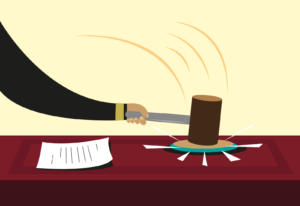When I was starting my career as a lawyer in the early 2000s, alternative dispute resolution (ADR) became very popular. ADR includes mediation and arbitration. During that time in my career, I was working mostly on transactional matters and some of the senior lawyers told me it could be legal malpractice not to at least discuss with our clients the benefits of putting an ADR provision into their commercial contracts.
The big selling points for arbitration were that ADR was less expensive, faster, and more private than traditional litigation. I have had innumerable mediations and they work well. I have seen cases settle at mediation that I never thought would settle. But mediation is non-binding, which means both parties must agree to any settlement and the mediator cannot force results on the parties.
Arbitration is very different than mediation. Arbitration is typically binding on the parties, which means the arbitrator’s ruling/award is binding on the parties. The prevailing party can then go to court to have the arbitration award reduced to a judgment. Once it is reduced to a judgment, the prevailing party can engage in collections as if they had prevailed in court. So, arbitration has very real results and oftentimes unexpected results. Imagine losing an arbitration for millions of dollars – and then having to pay that judgment, without any real chance even to appeal.
Major Differences Between Arbitration and Court Trials
The differences between arbitration and a court trial are much greater than most realize. One of the biggest differences is that arbitrators often only loosely (if at all) enforce even the most basic rules of evidence. If I had a dollar for every time an arbitrator said that they would hear clearly inadmissible evidence and “weigh it accordingly,” I would be a rich man now. The concept of inadmissible hearsay is almost non-existent in arbitrations. Experts are allowed to give undisclosed expert opinions at arbitrations, which would pretty much never be allowed at trial. Attorneys can lead on direct. And there are many other examples of evidentiary issues in arbitration that would never be allowed in a court trial.
Though an attorney can object to these evidentiary issues, arbitrators typically let all or most everything into the evidentiary record. Even when you prevail on an objection, it is not uncommon for arbitrators not to enforce that ruling later in the proceeding. For example, if opposing counsel leads on direct examination and you object, the arbitrator may grant your objection, but, two minutes later, opposing counsel can lead again and the arbitrator will neither admonish nor prohibit the obvious evidentiary violation. When you point out to the arbitrator what is happening, it is not uncommon for them to respond with: “I will give it the weight it deserves when I rule.”
Arbitrators often allow parties to disclose and use documents at the arbitration that they were supposed to have turned over to the other side months ago. In a court trial, civil procedure rules and scheduling orders dictate when documents and other evidence must be shared with the other party, and you produce something late at your peril. Our law firm has literally won cases because the other side failed to produce documents or produced them so late that the other side was prohibited from using them. We had one case in which the other side deposed a key witness from midnight to 4 a.m. for four days in a row (the witness was in a Russian jail cell at the time), but because the other side had not properly noted it, the judge refused even to look at the deposition transcript. Arbitrators often let these sorts of late documentary or witness testimony in with the proviso that it will be “given the weight it deserves.” We lawyers sometimes refer to this sort of thing as un-ringing a bell.
In court proceedings, discovery will always be at least somewhat limited by the rules of civil procedure, although often, a litigant can request additional discovery (e.g., additional depositions or additional discovery requests). Because arbitration is often chosen out of a belief that it will be faster and cheaper than litigation, it is common for arbitrators to severely limit both document discovery and the number of depositions. A golden rule for attorneys in litigation is to always depose a witness before they testify so you will know what they will say before they take the stand, before the judge or the jury. Because arbitrators are viewed as able to “give the testimony the weight it deserves”, it is quite common to have to see and question a witness for the first time at arbitration.
Other Issues with Arbitrations
Though lower costs are a reason commonly given for choosing arbitration over litigation, in my experience, arbitration usually costs at least as much as litigation, oftentimes even more. Sure, you might save some money by having more limited discovery, but it is also easier to stall an arbitration than a court trial and time invariably equals money. And judges are free and court fees typically are less than a thousand dollars. On the other hand, we have had big-dollar arbitrations with incredibly high arbitration fees (we are looking at one now in which the filing/administrative fee alone will be nearly $100,000 and this does not include the cost for the arbitrator, who will charge by the hour). We once had a London arbitration (if you think U.S. legal fees are high …) with three arbitrators who together were charging way north of $3,000 an hour, and that was many years ago, pre-inflation.
One of our lawyers tells of a time when a Miami-based client signed an agreement to arbitrate before a particular lawyer in Philadelphia and nobody from the client company knew who had chosen that arbitrator or why. The lawyer in our firm who worked on that case said that the case should have been an easy winner for us, but that he was afraid the arbitrator had been chosen by the other side for reasons that would benefit the other side. The arbitration happened, the arbitrator was excellent and fair, and we won. But it could have gone the other way. Yes, judges are assigned randomly to cases, but in many jurisdictions, it is possible to use a “peremptory challenge” to get that judge taken off your case. See e.g., California Code of Civil Procedure Section 170.6. More importantly, if you do end up with a bad ruling, you can appeal it.
In addition to not necessarily being any faster or cheaper than litigation, even the privacy element of arbitration is overrated. Most lawyers and companies just assume that arbitrations are private, but this actually varies by state and in some states they are only private if you agree to keep them private. Few contracts provide for such privacy.
My Concluding Remarks on Arbitrations
I could literally write a book on the flaws I have witnessed with arbitrations. The notion of due process often seems to be a foreign concept; unfair surprise is as much the norm as opposed to the exception.
Some simple fixes to the arbitration system, or to what lawyers put in their arbitration clauses, would go a long way. Just enforcing the rules of evidence would provide a much more level playing field. This can be put into your arbitration provision. Enforcing real deadlines reduces your arbitration expenses and it would be good if more arbitrators took this more seriously.
Though there are times when arbitration is unquestionably the best choice, and though I am always happy to explain arbitrations to clients contemplating arbitration, I find myself rarely recommending it. Call me jaded, but I have concluded that all too often the only people who benefit from arbitrations are lawyers who do not like the rigor of trial courts, those who want to stall, and the arbitrators themselves, who always, always get paid well (as they should) for acting as an arbitrator.























